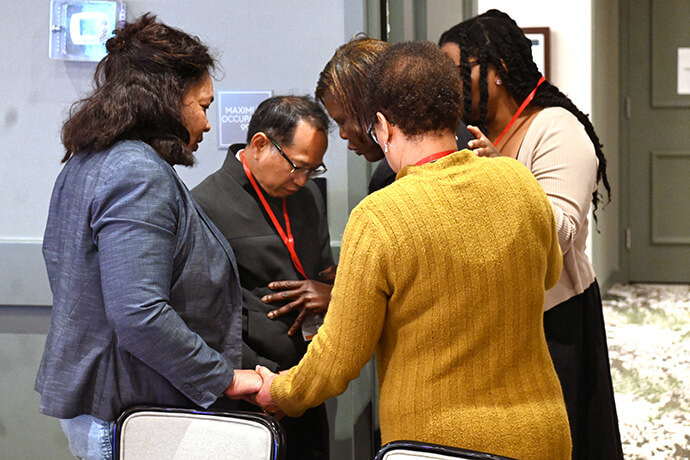Key points:
- The Facing the Future conference offered space for clergy to share challenges, recenter and envision the ministry ahead.
- The Rev. Giovanni Arroyo called for a revival for cross-cultural and cross-racial pastors, many of whom are struggling with the demands of leading mostly white local churches.
- Arroyo, top executive of the United Methodist Commission on Religion and Race, cited the story of the prophet Elijah as relevant to the experiences of cross-cultural and cross-racial clergy.
The Rev. Hungsu Lim remembers a congregant reacting badly to the suggestion that he mentor a younger church member to take a leadership role in the church, and eventually replace him.
“He actually started screaming at me, ‘You are not my pastor! I will leave this church unless you leave!’”
Lim is a Korean American pastor at St. John’s United Methodist Church in Buena Vista, Virginia. The incident happened at a previous appointment.
In the end, both the church member and Lim moved on.
“I left the church because it’s a really toxic environment,” Lim recalled. “Any leadership position is not meant to be held by one person for 40 or 50 years. But he wanted to be the person.
“And he’s been there for 50 years, and you’ve been there a year.”
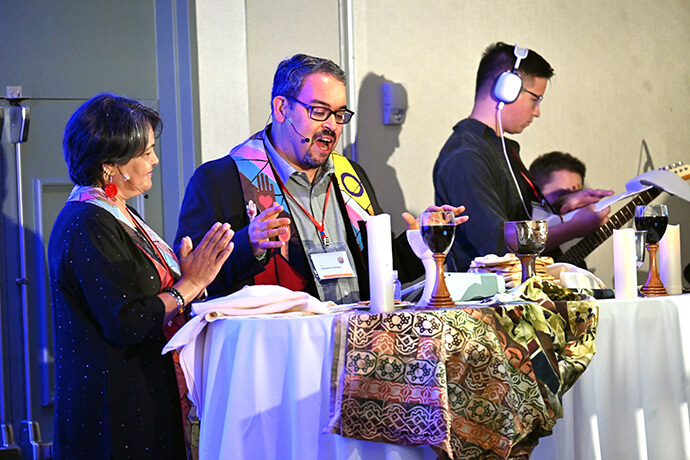
That’s the way cross-racial and cross-cultural appointments go sometimes in The United Methodist Church. Weariness and stress were oft-repeated complaints by the clergy who gathered at Facing the Future 2025, held Oct.7-9 in Los Angeles. So were frustration at racism, hostility and disinterest.
Cross-racial and cross-cultural clergy face all of that and more, said the Rev. Tércio Junker, pastor of Friendship United Methodist Church in Bolingbrook, Illinois, who spoke at the conference.
“(We) often move through spaces where we are simultaneously welcomed and questioned, celebrated and scrutinized,” said Junker, a native of Brazil. “We also stand against the idols of our time — racism, nationalism, homophobia, transphobia, ethnophobia, xenophobia, greed — and then we find ourselves exhausted, wondering if we can go on.”
At Facing the Future, organized by the United Methodist Commission on Religion and Race with help from various UMC-related organizations, the story of the prophet Elijah was offered as a way to understand this moment in time.
In 1 Kings 19, Elijah flees and hides in a cave. He collapses under a tree, loses his courage and prays for the end of his life.
“God’s voice does not come in fire or earthquake but in the sound of complete silence,” Junker said during his presentation. “This story is our map. When the noise of the world becomes unbearable, and when fear is loud and the truth seems fragile, God’s whisper still calls us back to our center. The whisper is God’s gentle reminder that life is stronger than death and that love is more powerful than hate.”
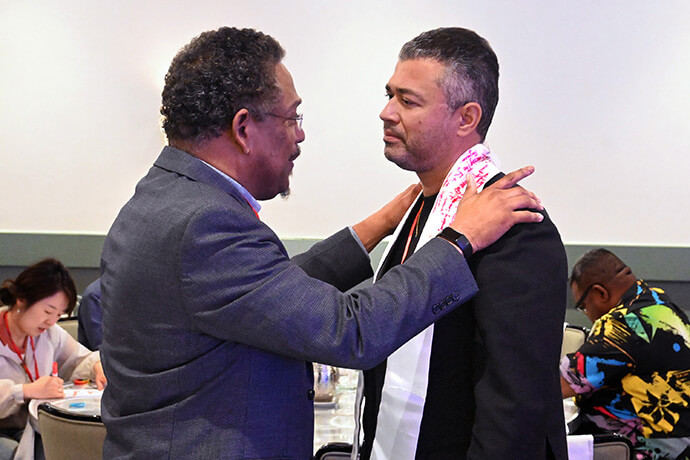
A pastor who is a native of Puerto Rico commented during one of the Facing the Future workshops that his “foreign” sounding name made 60% of his new parishioners angry about the appointment before he even arrived.
“So, then you’re coming into a crisis from day one,” he said. “That church decided to be in racism many years before I was born, yet I have to be the one to save them from that reality when they haven’t even consented to that.”
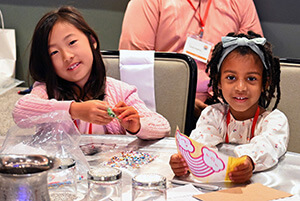
Facing the Future photos
View more images from the United Methodist Commission on Race and Religion's national conference in Los Angeles on our Flickr page.
Some pastors in cross-cultural ministry feel they need to be “superheroes,” said the Rev. Giovanni Arroyo, top executive of Religion and Race, on the last day of the conference.
“You cannot let your guard down, you cannot even show or display exhaustion, and you cannot let your emotions be noticed because you need to show that you can take this and more,” Arroyo said.
“I think revival begins not by denying our exhaustion, not by denying our reality, but by meaning that’s when revival begins, when we are able to be where we are and then letting the spirit breathe into us. Elijah cannot receive the mantle until he first released what no longer gave life.”
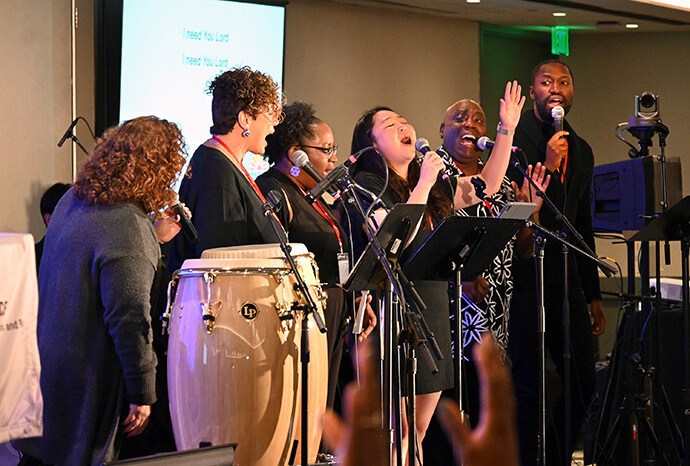
There were lighter moments at the conference, including joyous dancing to the music of a group of singers and musicians recruited for the meeting by the Rev. Lydia Muñoz, executive director of El Plan for Hispanic/Latine Ministry of The United Methodist Church. Muñoz, who also preached during the conference, called the band the Facing the Future Praise Team.
There were 224 people at the conference, 183 of them clergy. Nearly half were African Americans, with Asians, Hispanics, Pacific Islanders, Caucasians and Native Americans making up the rest.
The political divide in the U.S. came up frequently at the conference, especially the plight of undocumented immigrants amid the current administration’s crackdown. The Rev. Grace Imathiu spoke about Christian nationalism in her address. The Kenya native is senior pastor of First United Methodist Church in Evanston, Illinois, and also has led churches in her homeland.
“We are facing an idolatry that seeks power through domination, an idolatry that is called Christian nationalism,” Imathiu said. “The idea is to fuse Christianity with civic life, blurring the lines between Gospel and political power.
“Here is the reality,” she said. “When the flag rises above the cross, the Gospel is compromised. We have historical examples such as Nazi Germany that show how dangerous this fusion can be, and they show us the danger of actually muzzling prophets by … making them employees who speak for such systems.”
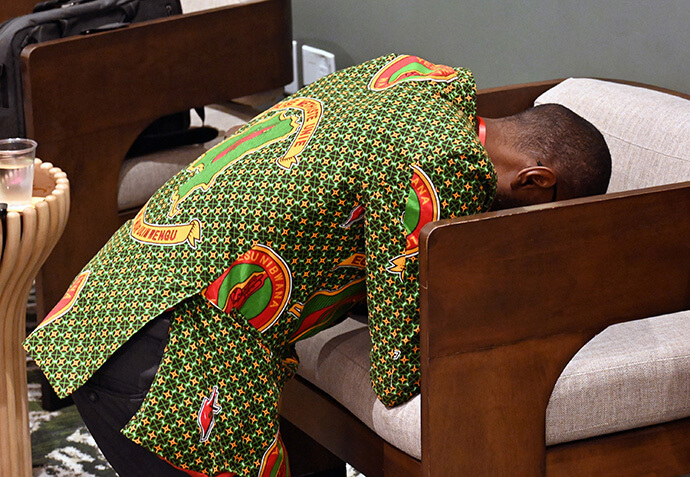
Monalisa S. Tui’tahi, a Pacific Islander immigration attorney who works as immigration ministries coordinator for the California-Pacific Conference, said immigrants attending the conference were apprehensive because of Immigration and Customs Enforcement raids across the country.
“The everyday run of the mill things that cross-racial and cross-cultural clergy have to deal with, that’s a heavy load,” she said. “Add this season where the narrative of hate, the narrative of deep division, the narrative of Christian nationalism (are present). How do you navigate that as a pastor in the pulpit?”
Subscribe to our
e-newsletter
The Rev. Lacey Hughes, an African American and pastor of Asbury United Methodist Church in Nokesville, Virginia, said he was well received upon arrival at the primarily white church that has about 25 worshippers on any given Sunday.
“I am a part-time licensed local pastor who was assigned an appointment at Asbury in 2021,” he said. “The church was founded in 1893 by two Confederate soldiers.”
He does preach about racism at times.
“There’s shame,” Hughes said. “But the people who are there don’t need that as much as the people who are not.”
He only sees some community members, he said, “when they need something,” such as weddings and funerals, or when the church hosts barbecues or pancake and sausage suppers.
“I have to walk a very fine line. … I tell them I can work with your soul. I can provide you soul care. I’m not your chef.”
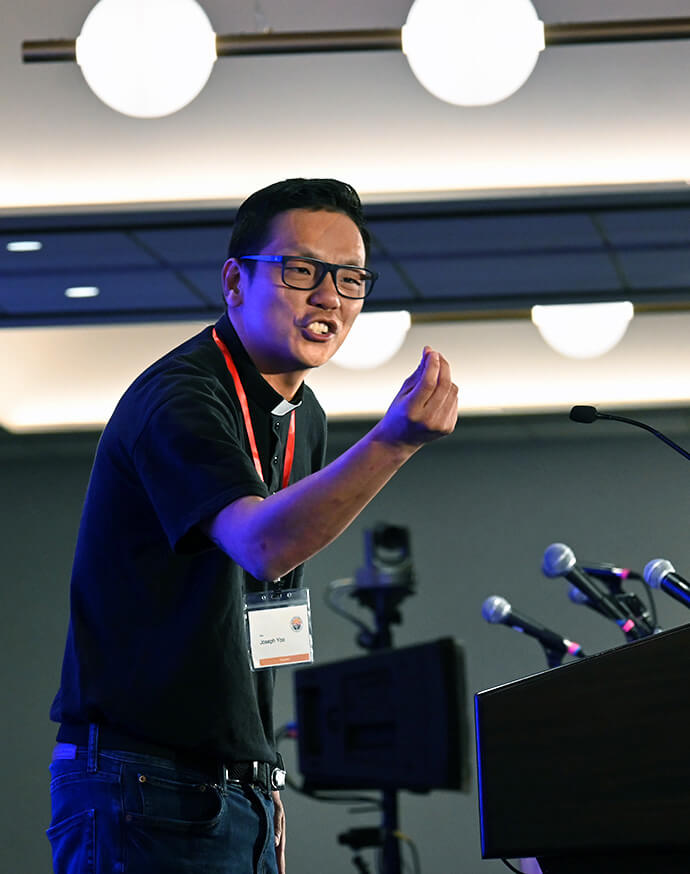
Cross-racial and cross-cultural pastors need a path to revival, Arroyo said.
“We are not called to manage diversity,” he said. “We are called to minister in it, to see in every intersection the image of God.”
Like Elijah, revival must start with release, “setting those plows down,” Arroyo said.
“Ask yourself, what is one thing I need to release for revival to happen?”
If they ask that question, Arroyo said God would answer “in time.”
“Do you realize that you are a blessing … because your mere presence is transforming people’s lives?” he said. “You are a blessing because a simple smile or handshake or ‘God bless you,’ is stopping someone from committing suicide?
“You are a blessing to a family who might be experiencing separation. Grief because of loss of life. Separation because of ICE. Separation because of divorce. Separation because of conflict between family members.
“Because you sit, listen, cry and pray, you become an agent of transformation. … I want to remind ourselves of that as we revive and live into the fullness of God’s calling in our life. We are a blessing.”
Patterson is a UM News reporter in Nashville, Tennessee. Contact him at 615-742-5470 or newsdesk@umcom.org. To read more United Methodist news, to the free Daily or Weekly Digests.
